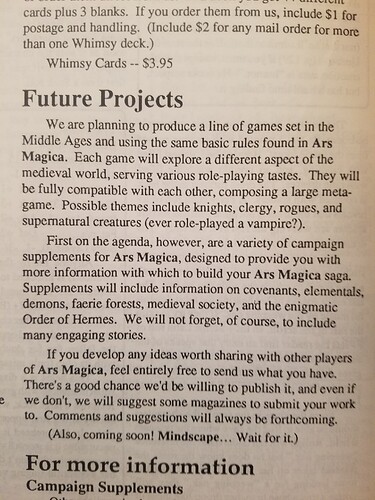On the last page of Ars Magica 1st edition, we were told that Lion Rampant was developing "a line of games set in the Middle Ages and using the same basic rules found in Ars Magica". They mentioned games about knights, clergy, and rogues.
Obviously, it never happened. But David Chart mentioned "other games set in Mythic Europe" in another thread, and others have expressed the same sentiment elsewhere.
What would you like to see?
I would love to have just what they promised us in 1987. Particularly the one about knights. There's Pendragon for that, and there's some very good stuff in there (I especially like the virtue/passion system), but there are some oddities too, as well as the limitations of it being set only in the Arthurian period.
Or, just skip the step of creating three more individual games, each focusing on a particular class or profession, and go ahead to the "one large meta-game", in which players can choose which class they like best. Yes, I know: "Ars Magica rejects the assumption that..." but maybe it's time to move past that.
So then the question would be how to balance it so that magi aren't as overwhelmingly powerful as they are in ArM. I don't really think it would take that much. Develop the True Faith/Miracles into a fully working system for clerics: give them lists of sacraments, rites, prayers, litanies, devotions, etc., and increase the magic resistance granted by the Divine. Do that last bit for knights (and other men at arms) too, at least those who have True Faith and are in good standing. Finally, at last, come up with a really good, working combat system (I've actually got one of my own for my home games). For rogues, magical protection is more problematic, as they're not likely to be very holy. Perhaps give them access to a black market trade in amulets and talismans created by hedge wizards and fringe sorcerers, which actually work. Perhaps say that the Parma is not actually quite so unique as the members of the Order formerly arrogantly believed.
Then, begin to develop the chivalric world, the Church, and the world of thieves' guilds to the same extent that the Order has been. This would take a while, of course, but it would be fun. There's lots of material, of course, for chivalry and the Church. I'd start with Chivalry by Maurice Keen for knights. For rogues, there would have to be more making stuff up (like was done for magic), but Rinconete y Cortadillo by Cervantes would be a good place to start.
Other ideas?
